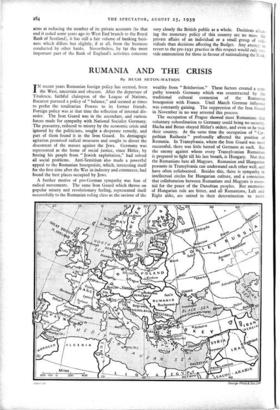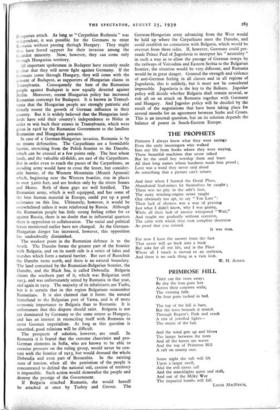RUMANIA AND THE CRISIS
By HUGH SETON-WATSON
IN recent years Rumanian foreign policy has seemed, from the West, uncertain and obscure. After the departure of Titulescu, faithful chimpion of the League of Nations, Bucarest pursued a policy of " balance," and seemed at times to prefer the totalitarian Powers to its former friends. Foreign policy was at that time the reflection of internal dis- order. The Iron Guard was in the ascendant, and various forces made for sympathy with National Socialist Germany. The peasantry, reduced to misery by the economic crisis and ignored by the politicians, sought a desperate remedy, and part of them found it in the Iron Guard. Its demagogic agitation promised radical measures and sought to divert the discontent of the masses against the Jews. Germany was represented as the home of social justice, since Hitler, by freeing his people from " Jewish exploitation," had solved all social problems. Anti-Semitism also made a powerful appeal to the Rumanian bourgeoisie, which, interesting itself for the first time after the War in industry and commerce, had found the best places occupied by Jews.
A further motive of pro-German sympathy was fear of radical movements. The same Iron Guard which throve on popular misery and revolutionary feeling, represented itself successfully to the Rumanian ruling class as the saviour of the wealthy from " Bolshevism." These factors created a sym- pathy towards Germany which was counteracted by the traditional cultural connexion of the Rumanian bourgeoisie with France. Until March German influence was constantly gaining The suppression of the Iron Guard in November in no way arrested this process.
The occupation of Prague showed most Rumanians that voluntary subordination to Germany could bring no security. Hacha and Beran obeyed Hitler's orders, and even so he took their country. At the same time the occupation of " Car- pathian Ruthenia " profoundly affected the position of Rumania. In Transylvania, where the Iron Guard was most successful, there was little hatred of Germans as such. But the enemy against whom every Transylvanian Rumanian is prepared to fight till his last breath, is Hungary. Not that the Rumanians hate all Magyars. Rumanian and Hungarian peasants in Transylvania can understand each other well, and have often collaborated. Besides this, there is sympathy in intellectual circles for Hungarian culture, and a conviction that collaboration between Rumanians and Magyars is essen- tial for the peace of the Danubian peoples. But memories of Hungarian rule are bitter, and all Rumanians, Left and Right alike, are united in their determination to resist ingarian attack. As long as " Carpathian Ruthenia " was in ependent, it was possible for the Germans to enter R..mania without passing through Hungary. They might this have found support for their invasion among the (3,:ardist minority. Now, however, they can come only tr-ough Hungarian territory.
All important spokesmen in Budapest have recently made it clear that they will never fight against Germany. If the Germans come through Hungary, they will come with the consent of Budapest, as supporters of Hungarian claims in '1 ransylvania. Consequently the hate of the Rumanian people against Budapest is now equally directed against Berlin. Moreover, recent Hungarian policy has increased Rumanian contempt for Budapest. It is known in Transyl- vania that the Hungarian people are strongly patriotic and bitterly resent the growth of German influence in their country. But it is widely believed that the Hungarian land- lords have sold their country's independence to Hider in order to win back their estates in Transylvania, which were given in 1918 by the Rumanian Government to the landless Rumanian and Hungarian peasants.
In case of a German-Hungarian invasion, Rumania is by no means defenceless. The Carpathians are a formidable barrier, stretching from the Polish frontier to the Danube, which can be crossed at a few points only. The best wheat lands, and the valuable oil-fields, are east of the Carpathians. But in order even to reach the passes of the Carpathians, an invading army would have to cross the lesser, but consider- able barrier, of the Western Mountains (Muntii Apuseni) which, beginning near the Western frontier, rise in places to over 5,000 feet, and are broken only by the rivers Somes and Mures. Both of these gaps are well fortified. The Rumanian army, which is well equipped, and has some of the best human material in Europe, could put up a good resistance on this line. Ultimately, however, it would be overwhelmed unless it were reinforced by Russia. Although the Rumanian people has little strong feeling either for or against Russia, there is no doubt that in influential quarters there is opposition to collaboration. The social and political forces mentioned earlier have not changed. As the German- Hungarian danger has increased, however, this opposition has undoubtedly diminished.
The weakest point in the Rumanian defence is to the South. The Danube forms the greater part of the frontier with Bulgaria, and on its north side is a series of lakes and marshes which form a natural barrier. But east of Rustchuk the Danube turns north, and there is no natural boundary. The land contained by the Rumanian-Bulgarian frontier, the Danube, and the Black Sea, is called Dobrudja. Bulgaria claims the southern part of it, which was Bulgarian until 1913, and was unfortunately seized by Rumania in that year, and again in 1919. The majority of its inhabitants are Turks, but it is certain that in this region Bulgarians outnumber Rumanians. It is also claimed that it forms the natural hinterland to thz. Bulgarian port of Varna, and is of more economic importance to Bulgaria than to Rumania. It is unfortunate that this dispute should exist. Bulgaria is not yet dominated by Germany to the same extent as Hungary, and has an interest in reconciling itself with Rumania to resist German imperialism. As long as this question is unsettled, good relations will be difficult.
The prospects of solution, however, are small. In Rumania it is feared that the extreme chauvinist and pro- German elements in Sofia, who are known to be able to exercise pressure on the ruling group, would never be con- tent with the frontier of 1913, but would demand the whole Dobrudja and even part of Bessarabia. In the existing state of tension, when all the patriotism of the people is concentrated to defend the national soil, cession of territory is impossible. Such action would demoralise the people and destroy the prestige of the Government.
If Bulgaria attacked Rumania, she would herself be attacked at once by Turkey and Greece. The German-Hungarian army advancing from the West would be held up where the Carpathians meet the Danube, and could establish no connection with Bulgaria, which would be overrun from three sides. If, however, Germany could per- suade Prince Paul of Jugoslavia to interpret his " neutrality " in such a way as to allow the passage of German troops by the railways of Vojvodina and Eastern Serbia to the Bulgarian frontier, the situation would be very different, and Rumania would be in great danger. Granted the strength and violence of anti-German feeling in all classes and in all regions of Jugoslavia, this is unlikely, but it must not be considered impossible. Jugoslavia is the key to the Balkans. Jugoslav policy will decide whether Bulgaria shall remain neutral, or risk all on an attack on Rumania together with Germany and Hungary. And Jugoslav policy will be decided by the result of the negotiations that have been taking place for several months for an agreement between Serbs and Croats. This is an internal question, but on its solution depends the balance of power in South-Eastern Europe.









































 Previous page
Previous page